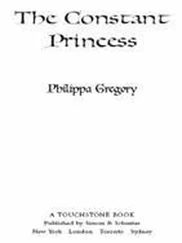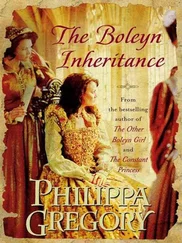“What will she do?”
“Delay as long as she can,” Robert predicted. “But the siege has to break one way or another, and then what?”
“And what will you do?”
“Watch her from a distance, pray for her, miss her like a mortal ache.”
In the middle of November Robert’s question was answered. The worst news came: the French queen regent’s forces had stormed out of the trap of Leith Castle and thrown their Protestant tormentors back to Stirling. The regent, for her daughter Mary, Queen of Scots, held Edinburgh once more, and the Protestant cause in Scotland was utterly defeated.
Winter 1559-60
AMY TRAVELED on the cold, wet roads back to Stanfield Hall, her girlhood home in Norfolk, for the winter season. The skies arching above the flat landscape were gray with rain clouds, the land beneath was brown speckled with gray flints, as drab as homespun and as poor. Amy rode through the cold with her hood up and her head down.
She did not expect to see Robert again before Christmas; she did not expect to see him at any time during the twelve days of the Christmas feast. She knew that he would be engaged at court, planning the festivities, organizing the masques, the players, the parties, and the hunting, for the court was determined to celebrate the winter feast, thinking, but not saying aloud, that it might be their last with Elizabeth as queen. She knew that her husband would be constantly at the side of the young queen: her lover, her friend, her intimate companion. She knew that whether they were lovers or whether they were estranged there was no one in the world for Robert but Elizabeth.
“I don’t blame him,” she whispered on her knees in Syderstone parish church, looking toward the blank space on the altar where the crucifix had once stood, looking to the plinth where a statue of the Virgin Mary had once raised her kindly stone hand to bless the faithful. “I won’t blame him,” she whispered to the empty spaces that were all that Elizabeth’s new priest had left for the faithful to turn to in prayer. “And I won’t blame her. I don’t want to blame either of them, anyone. I have to be free from my own rage and my own grief. I have to say that he can walk away from me, he can go to another woman, he can love her more than he ever loved me, and I have to release my jealousy and my pain and my grief from my heart. I have to let it all go, or it will destroy me.”
She dropped her head to her hands. “This pain in my breast which throbs all the time is my wound of grief,” she said. “It is like a spear thrust into my heart. I have to forgive him to make it heal. Every time I pluck at it with my jealousy the pain breaks out afresh. I will make myself forgive him. I will even make myself forgive her.”
She lifted her head from her hands and looked toward the altar. Faintly against the stone she could see the outline where the crucifix had hung. She closed her eyes and prayed to it as if it were still there. “I will not agree to the heresy of divorce. Even if he was to come back to me and say that she had changed her mind and she wanted them to marry, even then I would not consent to it. God joined Robert and me together; no one can put us apart. I know that. He knows that. Probably even she, in her poor sinful heart, knows that.”
In his grand rooms in Whitehall Cecil was laboring over the writing of a letter. It was addressed to the queen, but it was not in his usual brisk style of numbered points. It was a far more formal letter, composed by him for the Scottish Protestants to send to her. The circuitous route of the letter, from Cecil to Scotland, copied by the Scots lords in their own hands and sent back south urgently to the queen, was justified in Cecil’s mind because something had to shake Elizabeth into sending an English army into Scotland.
The French garrison at Leith had burst out of the siege and defeated the Scottish Protestants encamped before the castle. In the horror of his defeat the Earl of Arran, Cecil’s great hope in Scotland, was behaving most oddly: alternately raving with rage and lapsing into silence and tears. No feats of heroic leadership could be expected from poor James Hamilton, and no triumphant marriage with Elizabeth; the poor sweet-faced young man was clearly half mad and his defeat was pushing him over the brink. The Scottish lords were leaderless, on their own. Without Elizabeth’s support they were friendless too. What was a retreat now would be a rout when the French reinforcements landed, and Sir Nicholas Throckmorton, newly arrived from Paris, frantic with fear, warned that the French fleet was massing in all the Normandy ports, the troops were armed and would set sail as soon as there was a favorable wind. The ambassador swore that the French had no doubt that they would first conquer Scotland, and then march on England. They had no doubt at all that they would win. Your Grace, Cecil wrote for the Scots. As a fellow religionist, as an ally who fears the power of the French, as a neighbor and a friend, we beg you to come to our aid. If you do not support us, we stand alone against the usurping French, and there can be no doubt that after Scotland falls, the French will invade England. On that day, you will wish that you had helped us now, for there will be none of us alive to help you. We are not disloyal to Queen Mary of Scotland; we are defying her wicked advisors, the French, not her. We are defying the regent Mary of Guise who is ruling in the place of our true Queen Mary. The regent’s countrymen, French troops, are already engaged, any treaty you have with the French is already broken since they have taken up arms against us, on our soil. The regent’s family are our sworn enemies, and yours. If we had appealed like this to your father, he would have defended us and so united the kingdom; it was his great plan. Please, be your father’s true daughter and come to our aid. You can add what you like, Cecil wrote in a postscript to the Scots lords, but take care that you do not sound like rebels against a legitimate ruler; she will not support an outright rebellion. If the French have murdered any women and children by the time you come to write, you should tell her of it, and do not stint in the telling. Do not mention money; give her good reason to think that it will be a swift and cheap campaign. I leave you to tell her the current situation when this letter comes to you and you copy it and send it on. God speed, and God help you.
And God help us all, he said fearfully to himself as he folded it up and sealed it in three places with a blank seal. He had left it unsigned. Cecil only rarely put his name to anything.
A new masque, planned by Robert, was to have the ever-popular theme of Camelot; but not even he, with his determined charm, could put much joy in it.
The queen played the spirit of England, and sat on the throne while the young ladies of her chamber danced before her and the players came later with a specially written play to celebrate the greatness of Arthur’s England. There was an anti-masque of characters who threatened the golden glory of the round table, let no one doubt that one of the signs of a great kingdom was the existence of its enemies, but they were thrown down without much difficulty; in Robert’s fictional England there was no sign of Elizabeth’s constant terror of war.
Elizabeth, looking around the court through the dancers, saw Robert and made herself look past him. Robert, standing near enough to the throne to be summoned, should she want to speak to him, saw her dark eyes go by him and knew that he had been caught gazing at her.
Like a greensick boy, he said angrily to himself.
She looked once directly at him and gave him a faint smile, as if they were ghosts already, as if the shade of Elizabeth had dimly seen, through mist, the young man she had loved as a boy; and then she turned her head to Caspar von Breuner, the archduke’s ambassador, the ally that she must have, the husband she must marry, to ask him when he thought the archduke would arrive in England.
Читать дальше
Конец ознакомительного отрывка
Купить книгу












